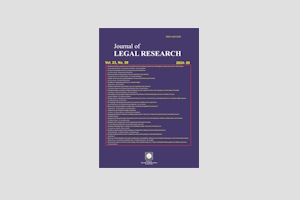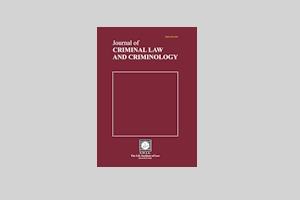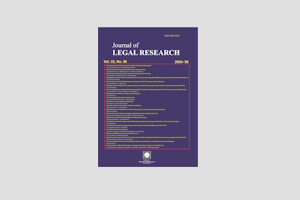Journal of
Legal Research
Number 20
Vol. X No. 2
Autumn 2011 – Winter 2012
Managing Editor: Vahid Eshtiagh
Editor-in-Chief: Seyyed Ghasem Zamani
CONTENTS
Articles
The Differences between Mistake and Ignorance to the Subject-Matter of Contract …
Ali Eslamipanah (Ph. D.)
Bankruptcy in Fault and Fraud: From Commercial Code to Islamic Penal Code
Mohammad Ali Jahed (Ph. D.) & Ramin Alizadeh
Complicity in Unintentional Crimes
Ghassem Mohammadi (Ph. D.) & Ehsan Abbaszadeh
Analysis The Theory of the Unification of Transnational Commercial Contracts Law
Mahmood Jalali (Ph. D.) & Masoomeh Shakouri
Concept and Nature of Future Contracts
Javad Hosseinzadeh (Ph. D.)
Peace and Human Rights in Curriculum under the International Instruments
Homayoon Mafi (Ph. D.) & Hossein Kavyar
Special Issue:
Cultural Heritage Law: Capacities and Challenges
Unable Justice and Preservation of Cultural Heritage
Mohammad-Hadi Zaker Hossein
Islamic Penal Code of Iran on Crimes against Cultural Property: 566 bis Article
Hassan Pourbaferani (Ph. D.) & Heydar Mansoori
Copyright Protection for Architectural Works
Soureh Sadeghi Esfahlani
Some Strategic Developments in Restitution of the Cultural Property in Contemporary International Law
Haleh Hosseini Akbarnezhad
New Developments in Restitution of Cultural Property with a View to Restitution of Indigenous People’s Cultural Property
Alireza Arashpour (Ph. D.) & Sara Balkhi
The Protection of Cultural Property in Times of Armed Conflicts: The Practice of the International Criminal Tribunal for the Former Yugoslavia
Heybatollah Nazhandi-Manesh (Ph. D.) & Mohammad Afrough
“Functional” Concept Evolution of Cultural Property in a More
Humanization of International Law
Hooriyeh Hosseini Akbarnezhad
Deficiencies in Legislations for Protection of Cultural Heritage
Sheyda Baradaran Bazaz
Right on the Historical Name of the Persian Gulf from the Perspective
of International Law
Sara Akbari
Examining Various Mechanisms for International Disputes over
Cultural Properties
Aramesh Shahbazi (Ph. D.)
Articles
Bankruptcy in Fault and Fraud:
From Commercial Code to Islamic Penal Code
Mohammad Ali Jahed (Ph. D.) & Ramin Alizadeh
Abstract:
One of the issues is that the country’s economy and financial
improvements to hurt bankruptcy. The Trade Act if the trader from
paying the debt he is responsible is considered unable to be bankrupt.
The rights of Iran to the three ordinary bankruptcy, fraud and the fault
is predicted that bankruptcy is not a normal crime, but fault
bankruptcy fraud and crime and punishment has been set for it.
In fact, bankruptcy fraud and criminal guilt, including titles that
referred to the Commercial Law and punishment in the Islamic Penal
Code 670 and 671 during the material has been stated, and because the
crime was premeditated and the businessman informed Cholera broke
his ill considered and their business practices or malpractice and
negligence has. In France the new law bankruptcy fraud division and
the manuscript and instead blame as the offense of bankruptcy is
predicted.
Keywords: Bankruptcy, Fraud, Fault
Concept and Nature of Future Contracts
Javad Hosseinzadeh (Ph. D.)
Abstract:
Future and forward contracts are regarded as a case of financial derivative instruments the public offering of which on a limited level in Iranian capital market, has recently come to commence by virtue of clause 11 of article 1 of Iran’s Securities Market Act 1384. This
article, by the lack of any legal definition of the contracts and for making law community familiar with such new financial instruments, seeks to explain the structure of future contracts in capital market, while describing the characteristics that distinguish them from forward contract. Moreover, the explanation of subject-matter of future contracts, how to terminate the contracts and how to exit the futures market and legal grounds of validity of such contracts shall constitute the discussions of this article.
Keywords: Future contract, Forward contract, Financial derivative
instruments, Securities market, Capital markets, Securities Market Act
Some Strategic Developments in Restitution of the
Cultural Property in Contemporary International Law
Haleh Hosseini Akbarnezhad
Abstract:
In the modern international system, restitution of the cultural property and alternative methods of it are important measures to settlement international disputes on the transport or robbery of cultural properties. This article explains about the situations in which such methods might be preferred to the classical judicial means and to examine the problems that might arise. An important point to this respect is that the development of other fields of international law especially human rights and humanitarian law affects on this issue. The promotion of the roles of some legal personality such as museums is an other considerable factor. Also the consideration of non-legal factors and a sense of “moral obligation,” can help the parties find a path to consensus and protect the cultural properties well.
Keywords: Cultural property, Restitution, Conditional Restitution,
Museum, Alternative Methods, Reparation, Loans, Donations, Cultural Cooperation
New Developments in Restitution of Cultural Property
with a View to Restitution
of Indigenous People’s Cultural Property
Alireza Arashpour (Ph. D.) & Sara Balkhi
Abstract:
Cultural awareness of countries has attentioned the issue of restitution of cultural property increasingly. This combined with the gradual development of international law and being human rights as one of the criteria of performance of governments the former divisions have been changed and new principles justify the claims related to restitution. In the light of such changes other actors like indigenous communities come into the input field and play roll beside the old ones ،to continue the species diversity.
Keywords: Cultural Property, Restitution, Cultural Rights, Human Rights, Indigenous Communities
“Functional” Concept Evolution of Cultural Property
in a More Humanization of International Law
Hooriyeh Hosseini Akbarnezhad
Abstract:
This article presents a more human, dynamic, and holistic perspective of cultural heritage, closely referring to the currently observed changes in its conceptual development. It argues that the conceptual focus of cultural heritage has shifted alongside three interrelated and
complementary directions: 1) from monuments to people; 2) from objects to functions; and thus 3) from preservation per se to purposeful preservation, sustainable use, and development. Conclusions are drawn in favor of an adequate reexamination and readaptation of the conceptual framework of cultural heritage, based on accepting its new functional socioeconomic dimension and integrating multiple perspectives from a variety of academic fields.
Keywords: Cultural property, Cultural heritage, Intangible cultural property, International Law, Function
Deficiencies in Legislations
for Protection of Cultural Heritage
Sheyda Baradaran Bazaz
Abstract:
Flashback historical identity ،are origin and progress of human in history despite the spiritual value of these works ،they always threatened to kill and plunder are located. Neglect of cultural heritage can be traced to deficiencies in legislation ،and the corporate head employee management weaknesses, lack of cultural attitudes and can be searched. This article examines some of the rules in the field of cultural heritage and national level we have just in case they happened to witness events and addressing the shortcomings of existing rules of international law in this area and at the end of the guidelines and suggestions offered.
Examining Various Mechanisms
for International Disputes over Cultural Properties
Aramesh Shahbazi (Ph. D.)
Disputes regarding cultural properties are so common in international relations. However despite the frequency of cultural properly dispute; there is currently no permanent and universally accepted framework for their resolution. While the most cultural disputes are international, they implicates a variety of legal norms and raises complex choice of legal questions such as conflicting evidentiary standards of proceeding and statutes of limitations. In this article we will analysis the various classic and modern dispute resolution mechanisms and will examine the best alternative ways by taking a look at the practice of the states.
Keywords: Cultural properties, Possession, Ownership, Dispute resolution, Alternative mechanisms





